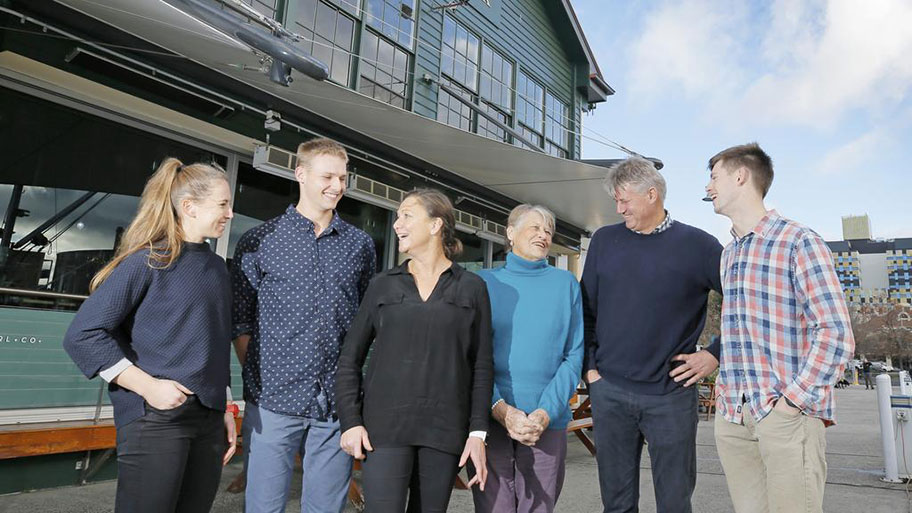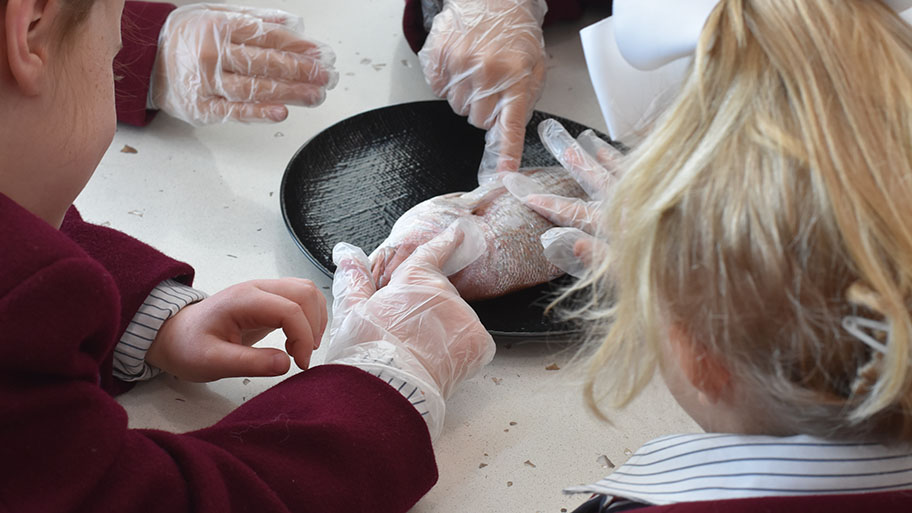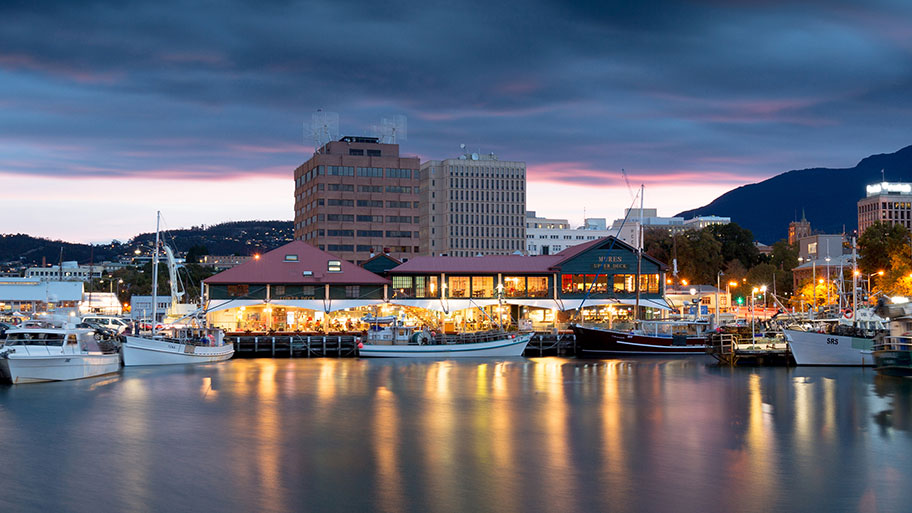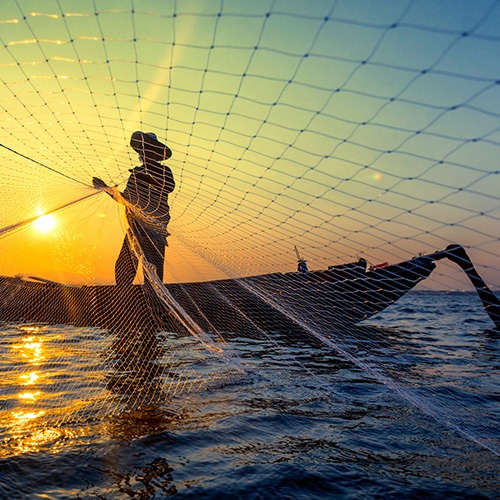The Mure family has been synonymous with sustainable seafood in Tasmania for more than four decades. The Mure’s fishing vessels, factory, restaurants and fishmonger have served multiple generations of seafood lovers.
In March 2020, they took another step forward in their business, gaining chain of custody certification to proudly serve MSC and ASC certified sustainable seafood across their three restaurants and fishmonger. Days later, the COVID-19 lockdown ground everything to a halt.
Despite this short-term pause, Mures Tasmania is focused firmly on the future, committed to the long-term sustainability of their business and the communities they serve. We recently caught up with Jude, Will, Jock and Wilson, to talk all things seafood and sustainability.

Q: What are your roles in the business?
"I'm the executive manager at Mures Fishing. We source our seafood from our boats, from other fisheries, and from the markets. And then we process fish and distribute to our own restaurants, other restaurants around Tasmania, and all sorts of places like IGAs and supermarkets.
"Once I finished school, I worked in the business for a year, and then I went off to uni to make sure that there wasn't something else out there for me that I wanted to do. About halfway through, I thought, no, I want to be back in the business. But I finished the course and then jumped straight back in here and loved it ever since."
"I’m Will's wife. I’m a director of the business, and have been involved ever since I met Will, a long, long, long time ago. We're involved in every part of Mures - every tiny inch of what we do and where we've been and where we're going."
Wilson Mure:
"I'm currently based mainly on the Mures Lower Deck, in the restaurant and fishmongers, overseeing a lot of things that go on there.
"I've been working here since 14, when I first started in the school holidays. We've been brought up, we used to go on fishing trips and holidays on the boats. We've always had that real strong connection with the water and the family business. I've always been very interested in continuing along in the business."
Will Mure:
"Husband of Jude. I’m a director of the business, involved, in aspects of the business. Earlier on, I was running a fishing boat. But for the last nearly 20 years, I suppose since my dad died, I've been more involved land-based with Jude in the business."
Q: What’s the story of the Mures business, from the start?
"My mum and dad were the founders of Mures in Tassie. They started with a small restaurant in Battery Point in Hobart, Tasmania, which won national awards as a seafood restaurant. It was cutting edge at the time, back in the 70s. But we couldn't source a reliable source of fresh fish, so my dad decided to go fishing. We built a boat, he fished a lot, and worked in the restaurant. Mum was the cook and chef, and my dad split his time between fishing and running the restaurant. They worked very hard.
Then we had an opportunity, back in the 80s, to develop a business on the waterfront between the two docks in Hobart, a prime location which was really wasted at the time. My dad spent a lot of time lobbying the government to give permission to actually build there. It took him 10 years. But eventually, the government agreed that it should be developed, and we leased the land off TasPorts, built what is now Mures Fish Centre, opened it at the end of 1987, and we've been going gangbusters since then in this business.
"At the time, when we first opened, it incorporated our processing factory within Mures Fish Centre, plus three restaurants: The Upper Deck, Lower Deck, and what was originally a sushi bar operated by a Japanese family. A lot of development of the business has happened over the years, including moving the factory out of the business. It’s now in Cambridge, which is a suburb outside of Hobart. We’ve expanded The Lower Deck and other parts of the business. And when the Japanese family didn't renew their lease, we took over that space as well and opened a third restaurant called Pearl + Co.
"Now there are three restaurants within the business, a fresh seafood outlet, fishmongers, and our factory out of Cambridge. And our fishing boat, as well. The fishing side of it has developed over the years. We've owned four commercial fishing vessels, one or two at a time, each time. We own one at the moment, the Diana, which is a 23-metre-long line boat for demersal species."

Q: How do you implement sustainability across the business?
"Sustainability, having fisheries for the long-term as part of that, has been a part of our business model right from the word go. We've always had that thought process. The way we catch fish, the way we utilise the fish, and even involvement from myself on various management advisory committees, which advise the government on ways to manage the fishery. That's what we've always done. So, that goes from the way that we catch fish, which is we use hooks, and we've always used hooks to catch fish. We found that to be a very low-impact fishery and selective as well. Selective in terms of the species of the catch, right through to our processing, and our waste.
"We're constantly working on our waste. The latest is reducing all plastics in our restaurants. Lower Deck is sort of a bistro, fast food, takeaway. We've done away with all plastic bottles, and we're constantly looking at ways of reducing impact on the environment. We recycle our cardboard, all our glass, all our plastics, aluminum. Recycling is part of our overall vision for how to lessen the impact we have as a business on the environment."
"We're very proud of it too. We've been orchestrating Mures Fish School for years now. That's to get the very enthusiastic youngsters in Hobart and beyond to come and see us and listen and see what we do. They always ask us about straws. That must've been the first thing that happened for sustainability, because these little kids will not touch a straw unless you can tell them it's paper. It's been a very good program, and that's ongoing."
Will Mure:
"There’s a story we tell through the Fish School - we target a fish called blue-eye trevalla, my dad did that back in the mid to late seventies full-time as a fishery. And we continue to do that in the same place that he used to fish over 40 years ago. That's a classic example of sustainability, where you can continue to fish a species forever. As long as you've got the science right behind it and you're only taking what can be regenerated every year and you're not damaging the ecosystem in any way, or as minimal impact as possible, you can have a fishery that does last forever."

Q: What have been the most significant changes that you've seen in the seafood sector in the years that you've been involved?
Jude Mure:
"It is sustainability, really. The awareness of sustainability. That's huge. People come in and are looking for an Australian product or a sustainable product. Some great work has been done in schools and in the media about this for them to come with that mindset.
"Some people still don't care. Some people are just after a price-driven thing, but I think there's a huge awareness of sustainability now. And then, with what Will's doing with the management side, the big picture stuff, to see the focus on quota continually being assessed by scientists, with the wild fishery.
"We're in Tassie, so we have a lot of the farmed fish happening here too. It probably is that whole awareness of sustainability which has been the biggest change."
Q: Why did you choose to pursue MSC and ASC Chain of Custody certification?
Will Mure:
Q: How was your experience gaining certification?
Jock Mure:
"Another thing we're very passionate about is our correct labeling of fish species and products. We do know that a lot of places out there get away with slapping a name on something. It's the same sort of idea that you can't just call anything sustainable, you've got to be able to trace back and prove it. There's obviously good reasons for it.
"There's definitely a process you have to implement to get certified. You have to change the habits of people that are down in the restaurants to follow the processes. Which is always hard work trying to get people to implement new processes. But it has to be done, it's about tracing it back to its original source. There's reasons why it's in place."
Q: How have you navigated the new challenges that the pandemic has thrown at the business?
Will Mure:
"It's been very challenging. We closed the whole business for seven weeks."
Will Mure:
"Yeah, everything. And restarting has been an amazing journey. It is like resetting your whole business. We've come back doing a lot of different things."
Jude Mure:
"Our staff were fantastic."
Jude Mure:
Will Mure:
"We opened the Lower Deck first and Pearl + Co, which is our small restaurant on the ground floor, and then we slowly started reopening the Upper Deck. And part of that process was Lower Deck was starting to pick up some good business, but Upper Deck was just: no one going. So we started taking people upstairs. Literally, Jude and I were. I said: Would you like eat upstairs today? Upstairs we've got that lovely fish and chips special on.
"So we were getting more people to go upstairs. And I think that's flown on as well. So a lot of new customers that we never would have had in the Upper Deck have gone up there and enjoyed the experience. Had a lovely fish and chip meal for 20 bucks, which you don't normally get in somewhere like the Upper Deck. And now they're continuing to come back and enjoy the Upper Deck as well. So it has been great reconnecting with the locals."
Jude Mure:
Wilson Mure:
Q: As things have opened back up, how have customers responded to seeing the MSC and ASC labels in the restaurants and fishmonger?
Will Mure:
Jude Mure:
Q: What's next for Mures?
"The big thing for us right now is to recover from the impacts of COVID, as would be the case right around the world. We're putting a lot of things into place to ensure that we are heading in the right direction. We've, obviously, got our winter to get through, which is very seasonable in Tasmania. So we've got to ensure we're in a strong position to get through the winter and come out the other side.
"We're starting to think about putting another fishing vessel on the water. Only a very small operation, a small line boat to catch some tuna species and some scalefish species around Tassie. It will help us supplement our fish coming through the business."
Jock Mure:
Will Mure:
Q: What's your favorite certified sustainable seafood, and your favorite way to enjoy it?
Jude Mure:
"We're going to tell you our favorite way of enjoying each of them because they're all wonderful."
Jock Mure:
"Currently in our restaurants, we've got blue grenadier, we've got tiger and king prawns from Exmouth Gulf, and we've got the toothfish, they are our MSC products. We've also got the Spencer Gulf kingfish and the salmon from Tassal as ASC products. The blue grenadier, we use that a lot as fish and chips down in the restaurants. It's perfect, because it's such a family-friendly fish and chip. You can't go wrong. You can never upset anyone. It's beautiful, flaky. Cooks up perfectly."
Jude Mure:
Will Mure:
"And the salmon. We do a really great dish in the Upper Deck, crispy skin. The way that they prepare the skin - they rub it in salt. Obviously, there's no scale. The way it's cooked with the fish, it's lovely. It's almost like a chip, it's just lovely and beautiful flavor. It's excellent.
"Toothfish is an amazing product. But because it's got that really good oil content, it's excellent for grilling. And I always think it would be nice with a béarnaise sauce or something like that. It's quite a mild-flavored fish as well, so having a lovely tasting sauce to go with it is great."

Q: What's one thing you'd like people who love Australian seafood to know about the care and effort which goes into catching and supplying this fish?
Will Mure:
Jude Mure:
Will Mure:
Jock Mure:
"There is a lot of good seafood around the world, and people shouldn’t just turn their nose up at something if it's not Australian. We look at our neighbors over in New Zealand, they do a lot of good seafood and sustainable seafood over there. There's nothing wrong with getting some product in from other places, as long as it's well managed and sustainable."

Photos courtesy of Mures Tasmania



